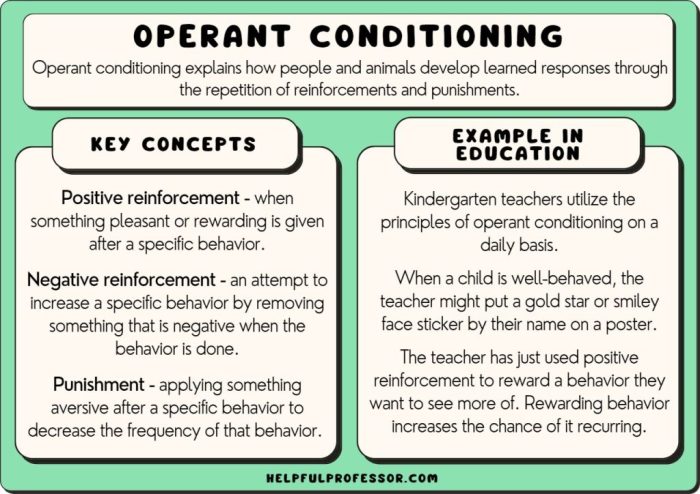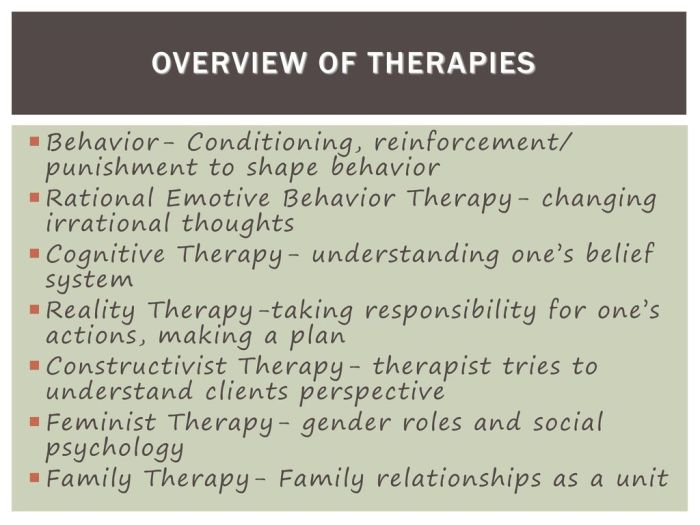Behavior therapists emphasize which of the following – Behavior therapists emphasize the fundamental principles of behavior change, including reinforcement, punishment, and extinction, in their therapeutic interventions. These principles guide the assessment, planning, and implementation of individualized treatment plans that target specific behaviors for modification.
Behavior therapy encompasses a range of techniques, such as applied behavior analysis (ABA), cognitive-behavioral therapy (CBT), and dialectical behavior therapy (DBT), each with specific methods and procedures backed by empirical evidence.
Behavioral Principles and Strategies: Behavior Therapists Emphasize Which Of The Following

Behavior therapists emphasize the importance of understanding and applying fundamental principles of behavior to facilitate change. These principles include reinforcement, punishment, and extinction. Reinforcement involves providing positive consequences to increase the likelihood of desired behaviors, while punishment involves delivering negative consequences to decrease the likelihood of undesired behaviors.
Extinction, on the other hand, involves removing reinforcing consequences to reduce the frequency of behaviors.
Assessment and Intervention Planning
Behavior therapists conduct comprehensive assessments to evaluate clients’ needs and behaviors. Functional analysis is a crucial step in identifying the antecedents (triggers) and consequences that maintain problematic behaviors. Based on assessment findings, individualized intervention plans are developed to address specific target behaviors and establish appropriate strategies for change.
Treatment Techniques and Modalities
Behavior therapists employ a range of treatment techniques, including applied behavior analysis (ABA), cognitive-behavioral therapy (CBT), and dialectical behavior therapy (DBT). ABA focuses on modifying observable behaviors through systematic reinforcement and punishment. CBT addresses the relationship between thoughts, emotions, and behaviors, while DBT incorporates mindfulness techniques to regulate emotions and improve interpersonal skills.
Collaboration and Communication
Collaboration between behavior therapists, clients, and other professionals is essential for successful outcomes. Effective communication builds rapport, facilitates treatment progress, and ensures that clients and their families are actively involved in the therapeutic process.
Ethical Considerations, Behavior therapists emphasize which of the following
Behavior therapists adhere to ethical guidelines that guide their practice. Informed consent, confidentiality, and cultural sensitivity are paramount. Ethical dilemmas that may arise, such as balancing client autonomy with safety concerns, are carefully considered and addressed in a responsible manner.
FAQ Overview
What is the primary focus of behavior therapists?
Behavior therapists focus on identifying and modifying specific behaviors through the application of behavioral principles.
How do behavior therapists assess clients?
Behavior therapists use a comprehensive assessment process, including functional analysis, to understand the antecedents and consequences of problematic behaviors.
What are some common techniques used in behavior therapy?
Behavior therapy encompasses a range of techniques, including applied behavior analysis (ABA), cognitive-behavioral therapy (CBT), and dialectical behavior therapy (DBT), each with specific methods and procedures.



